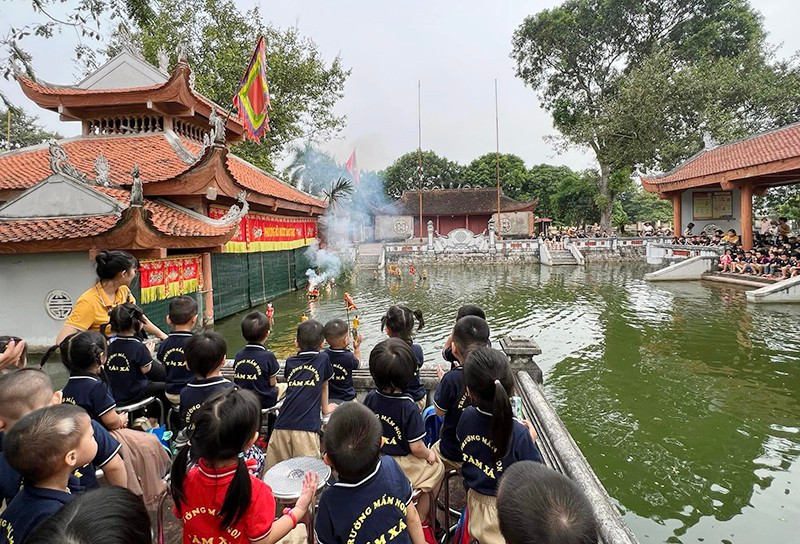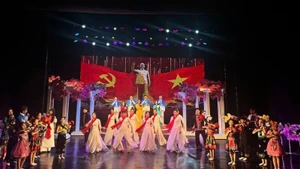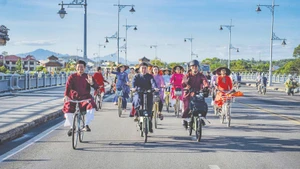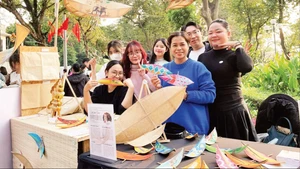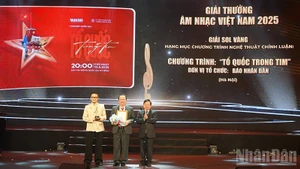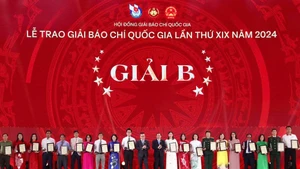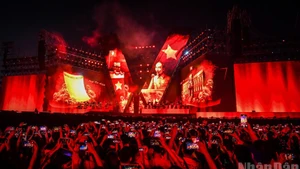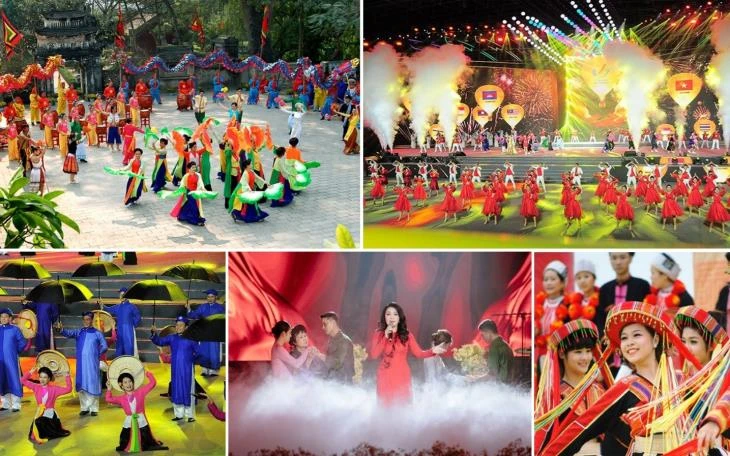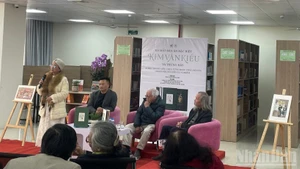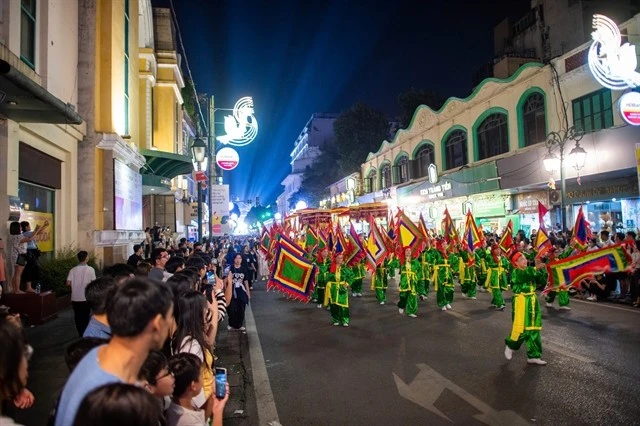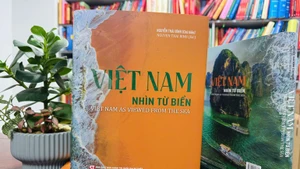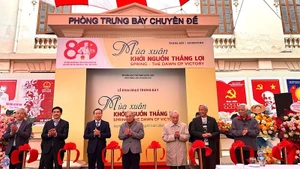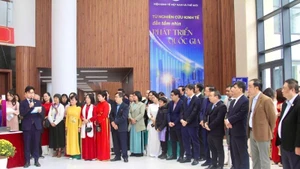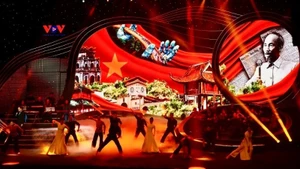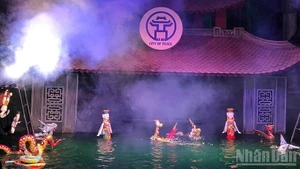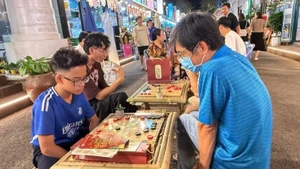In recent time, many agencies and units in the capital have been continuously innovating their approach to and exploitation of heritage to turn it into a resource for socio-economic development, as well as for developing cultural tourism and craft village-based tourism.
Currently, many types of heritages and relics come to life when they are creatively promoted and exploited to develop the cultural industry.
Heritages as economic resource
Artisans of Dao Thuc Water Puppet Ward, in Thuy Lam Commune, Dong Anh District, have welcomed guests almost every day since Lunar New Year. Some days, the artists perform two or three shows.
Nguyen The Nghi, the head of the business department of the Dao Thuc Water Puppet Ward, said that in recent years, the local government has paid attention to supporting the water puppet ward to develop tourism. In addition, visitors can also choose to visit and experience some monuments and craft villages in the area.
In 2022, the Hanoi Party Committee issued Resolution No. 09-NQ/TU on "Developing cultural industry in the capital in the 2021-2025 period, with orientation to 2030 and a vision to 2045".
The resolution sets out the goal of maximizing local advantages and potential, including cultural tourism, handicraft, performing arts, cinema, designing, culinary, entertainment software and games, advertising, architecture, photography and exhibition, fashion, television and radio, and publishing.
One year after Resolution No. 09 was issued, activities to exploit cultural heritage values took place in a very excited manner. After the impressive success of tour at night, the Hoa Lo Prison Relic Management Board continued with the launch of the "3rd Sacred Night: Youthful Fire" night tour. It's a night tour that aims to pay tribute to the great contributions and sacrifices of young patriotic and revolutionary soldiers who were imprisoned by French colonialists in Hoa Lo Prison. The tour was launched on the 92nd anniversary of the founding of the Ho Chi Minh Communist Youth Union.
Also, to mark the beginning of 2023, the Thang Long – Ha Noi Heritage Conservation Centre put the 'Deciphering the Imperial Citadel of Thang Long' night tour into operation for foreign visitors. The 120-minute tour has been chosen by many visitors.
In addition to relics and intangible cultural heritage, Hanoi has strengths in craft villages, with 1,350 craft villages of all kinds. Many craft villages have invested in infrastructure, implemented tourism services, and promoted digitisation, such as the Van Phuc silk, Quat Dong embroidery, Ha Thai lacquer villages.
Bat Trang Pottery Village has put the Centre of Vietnamese Quintessential Craft Villages into operation.
As a tourist from Thanh Hoa, Trinh Quoc Khanh said that many countries around the world often organise centres where tourists can visit, experience, and buy handicraft products. The model of the Centre of Vietnamese Quintessential Craft Villages is quite similar to these models. Although it mainly introduces the history and products of Bat Trang pottery, guests can also buy other handicraft products, which is very convenient.
Removing difficulties to promote development
According to Resolution No. 09-NQ/TU of the Hanoi Party Committee on "Developing cultural industry in the capital in the 2021-2025 period, with orientation to 2030 and a vision to 2045", the cultural industry will contribute about 5% of the city's GRDP. By 2030, the cultural industry will become a spearhead industry, striving to contribute about 8% of GRDP.
The city also proposes specific solutions to realise those goals. In which, the city will continue to invest in preserving old relics and heritages; build mechanisms to convert industrial heritages, old houses, villas, urban heritages, and memory heritages into new cultural heritages; and develop craft and traditional handicraft products.
However, there are still many challenges posed in promoting heritage values. As a World Heritage site by UNESCO, the Thang Long Imperial Citadel each year only welcomes a few hundred thousand tourists, that is not commensurate with its potential.
Hanoi has many forms of folk performing arts, but with city-level theatres, only Thang Long Water Puppet Theatre works very effectively. Not many craft villages are attracting tourism.
Heritage, no matter how valuable, is still just a "resource". To create an attraction to attract tourists, it is necessary to turn that heritage value into a product.
Hanoi needs more qualified human resources to participate in the cultural industry.
Director of Thang Long Cultural Research Institute Nguyen Viet Chuc said that Hanoi needs to train a culture-savvy team, plan long-term programs, launch products with depth and rich identity, ensuring the goal of promoting and honouring sustainable heritage."
Representative of Ha Thai Lacquer Village Association Do Trong Doan shared that the city needs to support building centres or showrooms to introduce products in craft villages, thus creating favourable conditions for businesses and production facilities, business, ease of access and exchange promote the circulation of goods.
For the design work, Chairwoman of the Hanoi Association of Handicrafts and Traditional Craft Villages Ha Thi Vinh suggested that schools and vocational training centres need to compile textbooks for students on product design and In-depth professional skills for each product line, encouraging young people in the craft village to go to vocational training in order to develop their profession in the locality.
In addition, promoting the digital transformation of craft villages is also an urgent task, especially in product promotion and tourism attraction.
To become one of the country's leading centres for the development of cultural industries, positioning the "Creative City" brand, Deputy Secretary of the City Party Committee Nguyen Van Phong emphasised that the city has set out group of tasks and solutions: Innovative thinking and raising awareness; focusing on building and perfecting development mechanisms and policies while promoting the development of human resources for the cultural industry; and strengthening the application of science and technology in the creation, production, dissemination and preservation of cultural products.
Specifically, Hanoi is willing to pilot policies related to the development of culture in general and the cultural industry in particular, thereby acting as a premise and drawing lessons that can be replicated throughout the country.
